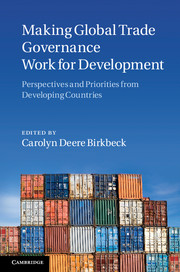 Making Global Trade Governance Work for Development
Making Global Trade Governance Work for Development Book contents
- Frontmatter
- Contents
- Figures
- Tables and boxes
- Contributors
- Acknowledgements
- Introduction
- Part I Global trade governance
- Part II Roles and responsibilities in global trade governance: diversity in developing country priorities and strategies
- Part III Strengthening multilateralism
- Part IV Making WTO negotiations and decision-making processes fairer
- 16 Towards fair and inclusive decision-making in WTO negotiations
- 17 Revisiting the single undertaking
- 18 Enhancing developing country participation in global trade governance through South–South coalitions in the WTO
- 19 Inclusive trade governance
- 20 Global trade governance and development
- Part V Conclusion
- Index
- References
18 - Enhancing developing country participation in global trade governance through South–South coalitions in the WTO
from Part IV - Making WTO negotiations and decision-making processes fairer
Published online by Cambridge University Press: 07 September 2011
- Frontmatter
- Contents
- Figures
- Tables and boxes
- Contributors
- Acknowledgements
- Introduction
- Part I Global trade governance
- Part II Roles and responsibilities in global trade governance: diversity in developing country priorities and strategies
- Part III Strengthening multilateralism
- Part IV Making WTO negotiations and decision-making processes fairer
- 16 Towards fair and inclusive decision-making in WTO negotiations
- 17 Revisiting the single undertaking
- 18 Enhancing developing country participation in global trade governance through South–South coalitions in the WTO
- 19 Inclusive trade governance
- 20 Global trade governance and development
- Part V Conclusion
- Index
- References
Summary
For much of the post-Second World War era, maintaining global trade governance has largely been the responsibility of developed countries, particularly under the 1947 General Agreement on Tariffs and Trade (GATT 1947). With the launch of the Uruguay Round, developing countries began to play a more active and consistent role in global trade governance. However, developing countries had and continue to struggle with how to ensure that their concerns and interests are reflected in global trade policy outcomes.
Today, the need for collective action by developing countries is greater and more urgent than ever, for several reasons. First, the world economy has an ever greater importance for developing countries’ national development, economic policy, environmental space and sovereignty. Second, the development process is increasingly complex and not conducive to sectoral or narrow approaches. Third, developed countries continue to dominate multilateral processes, institutions and outcomes in ways that impact developing countries’ political and economic space, as well as their opportunities to use their economic, social and environmental endowments.
- Type
- Chapter
- Information
- Making Global Trade Governance Work for DevelopmentPerspectives and Priorities from Developing Countries, pp. 507 - 528Publisher: Cambridge University PressPrint publication year: 2011
References
- 1
- Cited by
